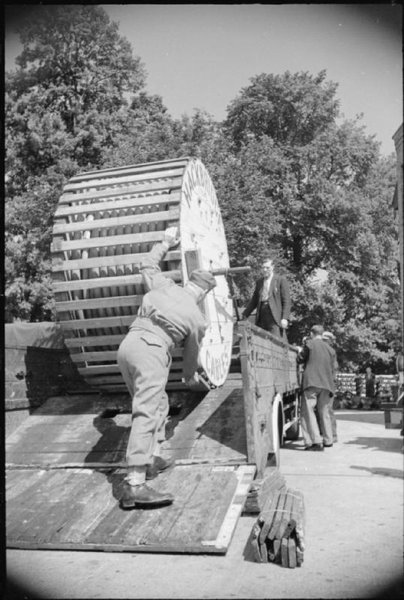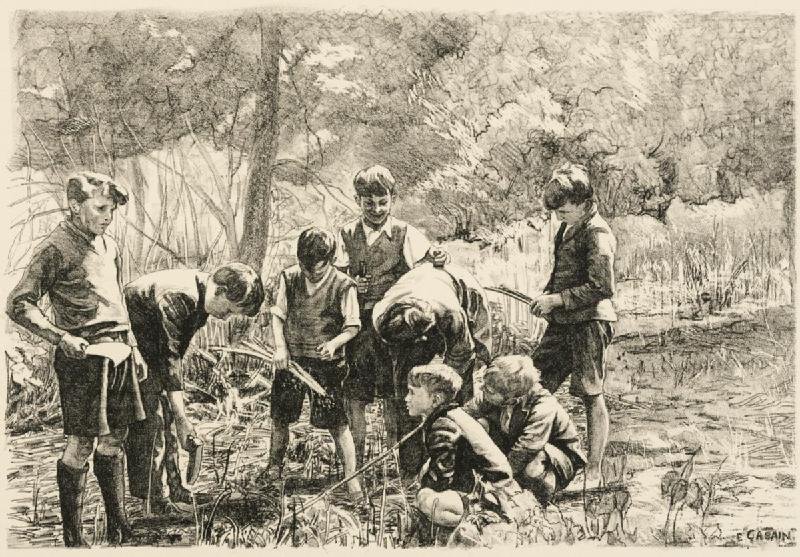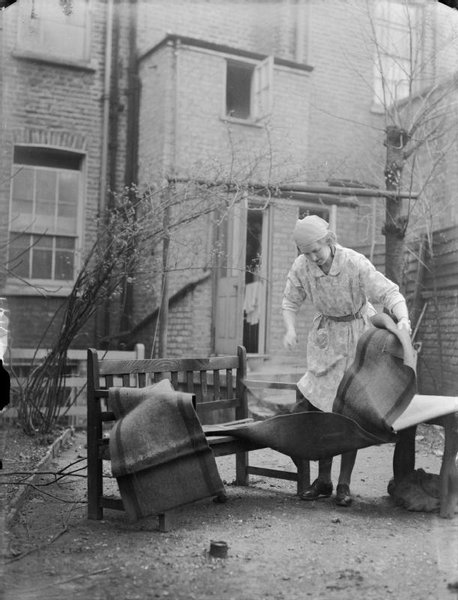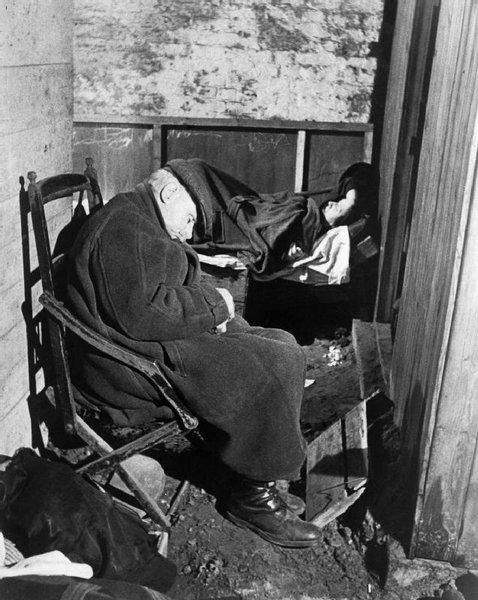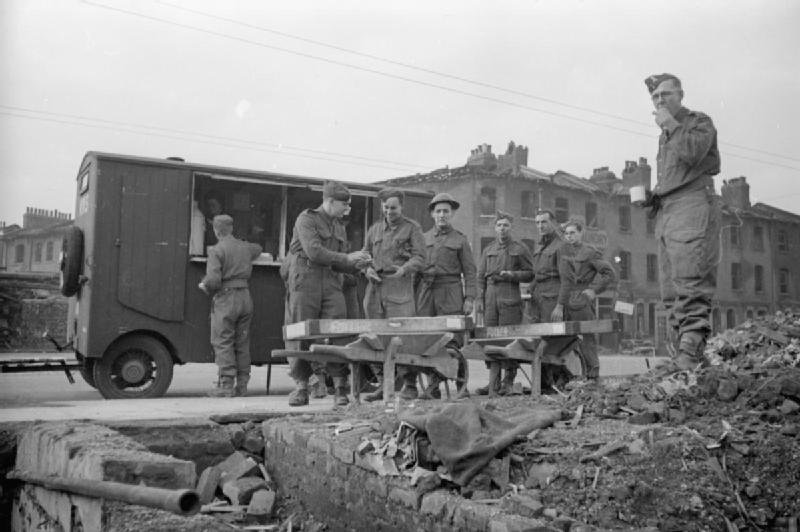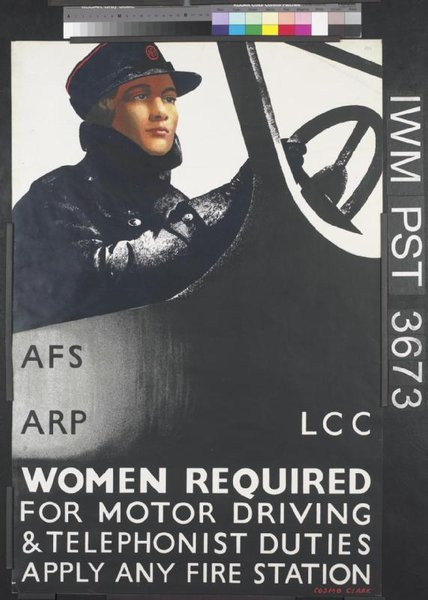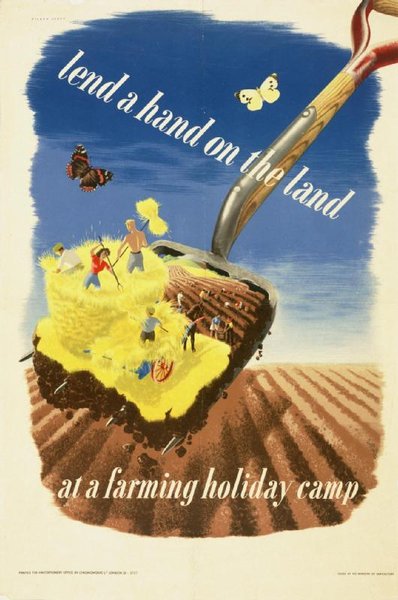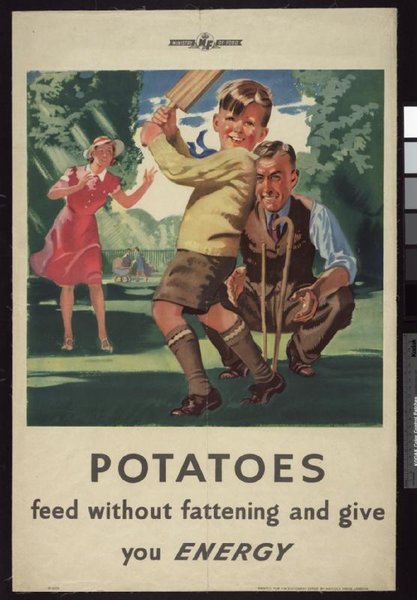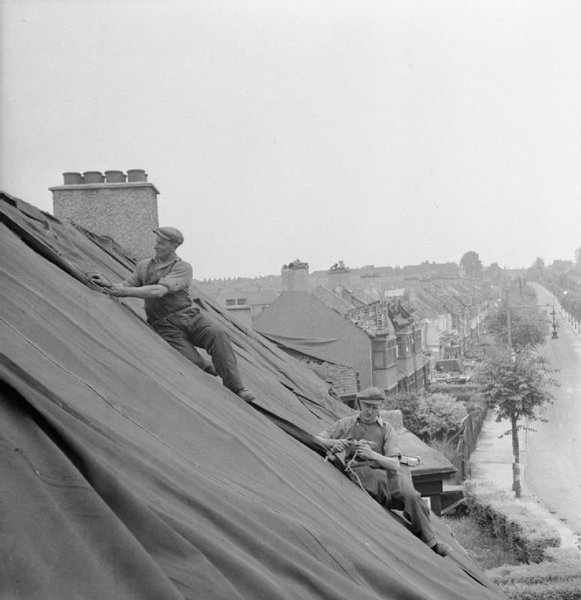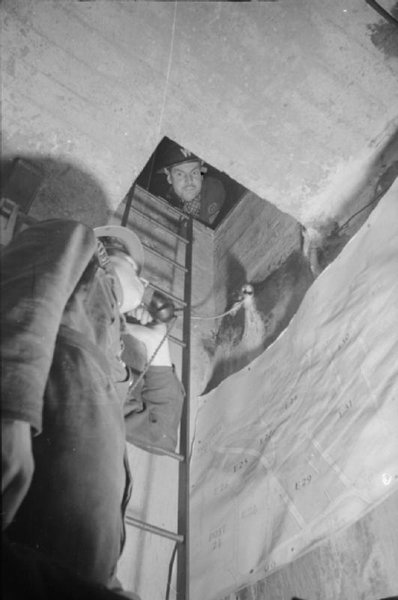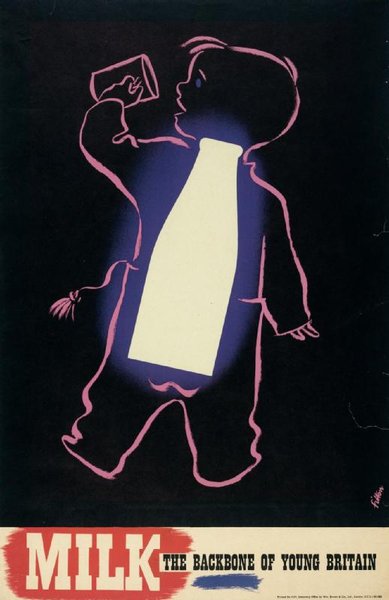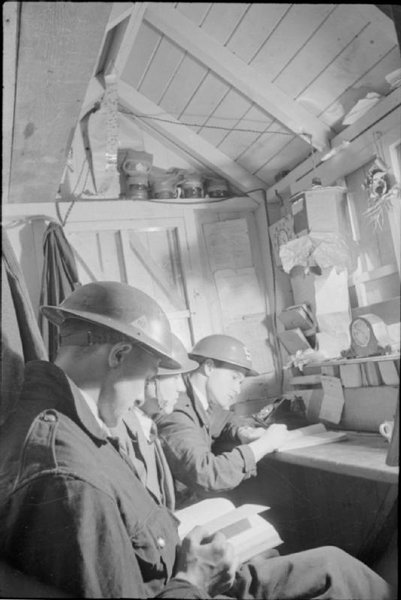High Explosive Bomb at Knatchbull Road
Description
High Explosive Bomb :
Source: 24 hours of Blitz Sept 7th 1940
Fell on Sept. 7, 1940, at 9:13 p.m.
Present-day address
Knatchbull Road, Camberwell, London Borough of Southwark, SE5 0TF, London
Further details
4 Knatchbull Road, Camberwell, SE5, London, UK ; 20x6 feet of brick wall damaged
Nearby Memories
Read people's stories relating to this area:
Contributed originally by BoyFarthing (BBC WW2 People's War)
I didn’t like to admit it, because everyone was saying how terrible it was, but all the goings on were more exciting than I’d ever imagined. Everything was changing. Some men came along and cut down all the iron railings in front of the houses in Digby Road (to make tanks they said); Boy scouts collected old aluminium saucepans (to make Spitfires); Machines came and dug huge holes in the Common right where we used to play football (to make sandbags); Everyone was given a gas mask (which I hated) that had to be carried wherever you went; An air raid shelter made from sheets of corrugated iron, was put up at the end of our garden, where the chickens used to be; Our trains were full of soldiers, waving and cheering, all going one way — towards the seaside; Silver barrage balloons floated over the rooftops; Policemen wore tin hats painted blue, with the letter P on the front; Fire engines were painted grey; At night it was pitch dark outside because of the blackout; Dad dug up most of his flower beds to plant potatoes and runner beans; And, best of all, I watched it all happening, day by day, almost on my own. That is, without all my school chums getting in the way and having to have their say. For they’d all been evacuated into the country somewhere or other, but our family were still at number 69, just as usual. For when the letters first came from our schools — the girls to go to Wales, me to Norfolk — Mum would have none of it. “Your not going anywhere” she said “We’re all staying together”. So we did. But it was never again the same as it used to be. Even though, as the weeks went by, and nothing happened, it was easy enough to forget that there was a war on at all.
Which is why, when it got to the first week of June 1940, it seemed only natural that, as usual, we went on our weeks summer holiday to Bognor Regis on the South coast, as usual. The fact that only the week before, our army had escaped from the Germans by the skin of its teeth by being ferried across the Channel from Dunkirk by almost anything that floated, was hardly remarked about. We had of course watched the endless trains rumble their way back from the direction of the seaside, silent and with the carriage blinds drawn, but that didn’t interfere with our plans. Mum and Dad had worked hard, saved hard, for their holiday and they weren’t having them upset by other people’s problems.
But for my Dad it meant a great deal more than that. During the first world war, as a young man of eighteen, he’d fought in the mud and blood of the trenches at Ypres, Passhendel and Vimy Ridge. He came back with the certain knowledge that all war is wrong. It may mean glory, fame and fortune to the handful who relish it, but for the great majority of ordinary men and their families it brings only hardship, pain and tears. His way of expressing it was to ignore it. To show the strength of his feelings by refusing to take part. Our family holiday to the very centre of the conflict, in the darkest days of our darkest hour, was one man’s public demonstration of his private beliefs
.
It started off just like any other Saturday afternoon: Dad in the garden, Mum in the kitchen, the two girls gone to the pictures, me just mucking about. Warm sunshine, clear blue skies. The air raid siren had just been sounded, but even that was normal. We’d got used to it by now. Just had to wait for the wailing and moaning to go quiet and, before you knew it, the cheerful high-pitched note of the all clear started up. But this time it didn’t. Instead, there comes the drone of aeroplane engines. Lots of them. High up. And the boom, boom, boom of anti-aircraft guns. The sound gets louder and louder until the air seems to quiver. And only then, when it seems almost overhead, can you see the tiny black dots against the deep, empty blue of the sky. Dozens and dozens of them. Neatly arranged in V shaped patterns, so high, so slow, they hardly seem to move. Then other, single dots, dropping down through them from above. The faint chatter of machine guns. A thin, black thread of smoke unravelling towards the ground. Is it one of theirs or one of ours? Clusters of tiny puffs of white, drifting along together like dandelion seeds. Then one, larger than the rest, gently parachuting towards the ground. And another. And another. Everything happening in the slowest of slow motions. Seeming to hang there in the sky, too lazy to get a move on. But still the black dots go on and on.
Dad goes off to meet the girls. Mum makes the tea. I can’t take my eyes off what’s going on. Great clouds of white and grey smoke billowing up into the sky way over beyond the school. People come out into the street to watch. The word goes round that “The poor old Docks have copped it”. By the time the sun goes down the planes have gone, the all clear sounded, and the smoke towers right across the horizon. Then as the light fades, a red fiery glow shines brighter and brighter. Even from this far away we can see it flicker and flash on the clouds above like some gigantic furnace. Everyone seems remarkably calm. As though not quite believing what they see. Then one of our neighbours, a man who always kept to himself, runs up and down the street shouting “Isleworth! Isleworth! It’s alright at Isleworth! Come on, we’ve all got to go to Isleworth! That’s where I’m going — Isleworth!” But no one takes any notice of him. And we can’t all go to Isleworth — wherever that is. Then where can we go? What can we do? And by way of an ironic answer, the siren starts it’s wailing again.
We spend that night in the shelter at the end of the garden. Listening to the crump of bombs in the distance. Thinking about the poor devils underneath it all. Among them are probably one of Dad’s close friends from work, George Nesbitt, a driver, his wife Iris, and their twelve-year-old daughter, Eileen. They live at Stepney, right by the docks. We’d once been there for tea. A block of flats with narrow stone stairs and tiny little rooms. From an iron balcony you could see over the high dock’s wall at the forest of cranes and painted funnels of the ships. Mr Nesbitt knew all about them. “ The red one with the yellow and black bands and the letter W is The West Indies Company. Came in on Wednesday with bananas, sugar, and I daresay a few crates of rum. She’s due to be loaded with flour, apples and tinned vegetables — and that one next to it…” He also knows a lot about birds. Every corner of their flat with a birdcage of chirping, flashing, brightly coloured feathers and bright, winking eyes. In the kitchen a tame parrot that coos and squawks in private conversation with Mrs Nesbitt. Eileen is a quiet girl who reads a lot and, like her mother, is quick to see the funny side of things. We’d once spent a holiday with them at Bognor. One of the best we’d ever had. Sitting here, in the chilly dankness of our shelter, it’s best not to think what might have happened to them. But difficult not to.
The next night is the same. Only worse. And the next. Ditto. We seem to have hardly slept. And it’s getting closer. More widely spread. Mum and Dad seem to take it in their stride. Unruffled by it all. Almost as though it wasn’t really happening. Anxious only to see that we’re not going cold or hungry. Then one night, after about a week of this, it suddenly landed on our doorstep.
At the end of our garden is a brick wall. On the other side, a short row of terraced houses. Then another, much higher, wall. And on the other side of that, the Berger paint factory. One of the largest in London. A place so inflammable that even the smallest fire there had always bought out the fire engines like a swarm of bees. Now the whole place is alight. Tanks exploding. Flames shooting high up in the air. Bright enough to read a newspaper if anyone was so daft. Firemen come rushing up through the garden. Rolling out hoses to train over the wall. Flattening out Dad’s delphiniums on the way. They’re astonished to find us sitting quietly sitting in our hole in the ground. “Get out!” they urge
“It’s about to go up! Make a run for it!” So we all troop off, trying to look as if we’re not in a hurry, to the public shelters on Hackney Marshes. Underground trenches, dripping with moisture, crammed with people on hard wooden planks, crying, arguing, trying to doze off. It was the longest night of my life. And at first light, after the all-clear, we walk back along Homerton High Street. So sure am I that our house had been burnt to a cinder, I can hardly bear to turn the corner into Digby Road. But it’s still there! Untouched! Unbowed! Firemen and hoses all gone. Everything remarkably normal. I feel a pang of guilt at running away and leaving it to its fate all by itself. Make it a silent promise that I won’t do it again. A promise that lasts for just two more nights of the blitz.
I hear it coming from a long way off. Through the din of gunfire and the clanging of fire engine and ambulance bells, a small, piercing, screeching sound. Rapidly getting louder and louder. Rising to a shriek. Cramming itself into our tiny shelter where we crouch. Reaching a crescendo of screaming violence that vibrates inside my head. To be obliterated by something even worse. A gigantic explosion that lifts the whole shelter…the whole garden…the whole of Digby Road, a foot into the air. When the shuddering stops, and a blanket of silence comes down, Dad says, calm as you like, “That was close!”. He clambers out into the darkness. I join him. He thinks it must have been on the other side of the railway. The glue factory perhaps. Or the box factory at the end of the road. And then, in the faintest of twilights, I just make out a jagged black shape where our house used to be.
When dawn breaks, we pick our way silently over the rubble of bricks and splintered wood that once was our home. None of it means a thing. It could have been anybody’s home, anywhere. We walk away. Away from Digby Road. I never even look back. I can’t. The heavy lead weight inside of me sees to that.
Just a few days before, one of the van drivers where Dad works had handed him a piece of paper. On it was written the name and address of one of Dad’s distant cousins. Someone he hadn’t seen for years. May Pelling. She had spotted the driver delivering in her High Street and had asked if he happened to know George Houser. “Of course — everyone knows good old George!”. So she scribbles down her address, asks him to give it to him and tell him that if ever he needs help in these terrible times, to contact her. That piece of paper was in his wallet, in the shelter, the night before. One of the few things we still had to our name. The address is 102 Osidge Lane, Southgate.
What are we doing here? Why here? Where is here? It’s certainly not Isleworth - but might just as well be. The tube station we got off said ’Southgate’. Yet Dad said this is North London. Or should it be North of London? Because, going by the map of the tube line in the carriage, which I’ve been studying, Southgate is only two stops from the end of the line. It’s just about falling off the edge of London altogether! And why ‘Piccadilly Line’? This is about as far from Piccadilly as the North Pole. Perhaps that’s the reason why we’ve come. No signs of bombs here. Come to that, not much of the war at all. Not country, not town. Not a place to be evacuated to, or from. Everything new. And clean. And tidy. Ornamental trees, laden with red berries, their leaves turning gold, line the pavements. A garden in front of every house. With a gate, a path, a lawn, and flowers. Everything staked, labelled, trimmed. Nothing out of place. Except us. I’ve still got my pyjama trousers tucked into my socks. The girls are wearing raincoats and headscarves. Dad has a muffler where his clean white collar usually is. Mum’s got on her old winter coat, the one she never goes out in. And carries a tied up bundle of bits and pieces we had in the shelter. Now and again I notice people giving us a sideways glance, then looking quickly away in case you might catch their eye. Are they shocked? embarrassed? shy, even? No one seems at all interested in asking if they can help this gaggle of strangers in a strange land. Not even the road sweeper when Dad asks him the way to Osidge Lane.
The door opens. A woman’s face. Dark eyes, dark hair, rosy cheeks. Her smile checked in mid air at the sight of us on her doorstep. Intake of breath. Eyes widen with shock. Her simple words brimming with concern. “George! Nell! What’s the matter?” Mum says:” We’ve just lost everything we had” An answer hardly audible through the choking sob in her throat. Biting her lip to keep back the tears. It was the first time I’d ever seen my mother cry.
We are immediately swept inside on a wave of compassion. Kind words, helping hands, sympathy, hot food and cups of tea. Aunt May lives here with her husband, Uncle Ernie and their ten-year-old daughter, Pam. And two single ladies sheltering from the blitz. Five people in a small three-bedroom house. Now the five of us turn up, unannounced, out of the blue. With nothing but our ration books and what we are wearing. Taken in and cared for by people I’d never even seen before.
In every way Osidge Lane is different from Digby Road. Yet it is just like coming home. We are safe. They are family. For this is a Houser house.
Contributed originally by kenyaines (BBC WW2 People's War)
After a few months of the tortuous daily Bus journey to Colfes Grammar School at Lewisham, I'd saved enough money to buy myself a new bicycle with the extra pocket money I got from Dad for helping in the shop.
Strictly speaking, it wasn't a new one, as these were unobtainable during the War, but the old boy in our local Cycle-Shop had some good second-hand frames, and he was still able to get Parts, so he made me up a nice Bike, Racing Handlebars, Three-Speed Gears, Dynamo Lighting and all.
I was very proud of my new Bike, and cycled to School every day once I'd got it, saving Mum the Bus-fare and never being late again.
I had a good friend called Sydney who I'd known since we were both small boys. He had a Bike too, and we would go out riding together in the evenings.
One Warm Sunday in the Early Summer, we went out for the day. Our idea was to cycle down the A20 and picnic at Wrotham Hill, A well known Kent beauty spot with views for miles over the Weald.
All went well until we reached the "Bull and Birchwood" Hotel at Farningham, where we found a rope stretched across the road, and a Policeman in attendance. He said that the other side of the rope was a restricted area and we couldn't go any further.
This was 1942, and we had no idea that road travel was restricted. Perhaps there was still a risk of Invasion. I do know that Dover and the other Coastal Towns were under bombardment from heavy Guns across the Channel throughout the War.
Anyway, we turned back and found a Transport Cafe open just outside Sidcup, which seemed to be a meeting place for cyclists.
We spent a pleasant hour there, then got on our bikes, stopping at the Woods on the way to pick some Bluebells to take home, just to prove we'd been to the Country.
In the Woods, we were surprised to meet two girls of our own age who lived near us, and who we knew slightly. They were out for a Cycle ride, and picking Bluebells too, so we all rode home together, showing off to one another, but we never saw the Girls again, I think we were all too young and shy to make any advances.
A while later, Sid suggested that we put our ages up and join the ARP. They wanted part-time Volunteers, he said.
This sounded exciting, but I was a bit apprehensive. I knew that I looked older than my years, but due to School rules, I'd only just started wearing long trousers, and feared that someone who knew my age might recognise me.
Sid told me that his cousin, the same age as us, was a Messenger, and they hadn't checked on his age, so I went along with it. As it turned out, they were glad to have us.
The ARP Post was in the Crypt of the local Church, where I,d gone every week before the war as a member of the Wolf-Cubs.
However, things were pretty quiet, and the ARP got boring after a while, there weren't many Alerts. We never did get our Uniforms, just a Tin-Hat, Service Gas-Mask, an Arm-band and a Badge.
We learnt how to use a Stirrup-Pump and to recognise anti-personnel bombs, that was about it.
In 1943, we heard that the National Fire Service was recruiting Youth Messengers.
This sounded much more exciting, as we thought we might get the chance to ride on a Fire-Engine, also the Uniform was a big attraction.
The NFS had recently been formed by combining the AFS with the Local and County Fire Brigades throughout the Country, making one National Force with a unified Chain of Command from Headquarters at Lambeth.
The nearest Fire-Station that we knew of was the old London Fire Brigade Station in Old Kent Road near "The Dun Cow" Pub, a well-known landmark.
With the ARP now behind us,we rode down there on our Bikes one evening to find out the gen.
The doors were all closed, but there was a large Bell-push on the Side-Door. I plucked up courage and pressed it.
The door was opened by a Firewoman, who seemed friendly enough. She told us that they had no Messengers there, but she'd ring up Divisional HQ to find out how we should go about getting details of the Service.
This Lady, who we got to know quite well when we were posted to the Station, was known as "Nobby", her surname being Clark.
She was one of the Watch-Room Staff who operated the big "Gamel" Set. This was connected to the Street Fire-Alarms, placed at strategic points all over the Station district or "Ground", as it was known. With the info from this or a call by telephone, they would "Ring the Bells down," and direct the Appliances to where they were needed when there was an alarm.
Nobby was also to figure in some dramatic events that took place on the night before the Official VE day in May 1945 when we held our own Victory Celebrations at the Fire-Station. But more of that at the end of my story.
She led us in to a corridor lined with white glazed tiles, and told us to wait, then went through a half-glass door into the Watch-Room on the right.
We saw her speak to another Firewoman with red Flashes on her shoulders, then go to the telephone.
In front of us was another half-glass door, which led into the main garage area of the Station. Through this, we could see two open Fire-Engines. One with ladders, and the other carrying a Fire-Escape with big Cart-wheels.
We knew that the Appliances had once been all red and polished brass, but they were now a matt greenish colour, even the big brass fire-bells, had been painted over.
As we peered through the glass, I spied a shiny steel pole with a red rubber mat on the floor round it over in the corner. The Firemen slid down this from the Rooms above to answer a call. I hardly dared hope that I'd be able to slide down it one day.
Soon Nobby was back. She told us that the Section-Leader who was organising the Youth Messenger Service for the Division was Mr Sims, who was stationed at Dulwich, and we'd have to get in touch with him.
She said he was at Peckham Fire Station, that evening, and we could go and see him there if we wished.
Peckham was only a couple of miles away, so we were away on our bikes, and got there in no time.
From what I remember of it, Peckham Fire Station was a more ornate building than Old Kent Road, and had a larger yard at the back.
Section-Leader Sims was a nice chap, he explained all about the NFS Messenger Service, and told us to report to him at Dulwich the following evening to fill in the forms and join if we still wanted to.
We couldn't wait of course, and although it was a long bike ride, were there bright and early next evening.
The signing-up over without any difficulty about our ages, Mr Sims showed us round the Station, and we spent the evening learning how the country was divided into Fire Areas and Divisions under the NFS, as well as looking over the Appliances.
To our delight, he told us that we'd be posted to Old Kent Road once they'd appointed someone to be I/C Messengers there. However, for the first couple of weeks, our evenings were spent at Dulwich, doing a bit of training, during which time we were kitted out with Uniforms.
To our disappointment, we didn't get the same suit as the Firemen with a double row of silver buttons on the Jacket.
The Messenger's Uniform consisted of a navy-blue Battledress with red Badges and Lanyard, topped by a stiff-peaked Cap with red piping and metal NFS Badge, the same as the Firemen's. We also got a Cape and Leggings for bad weather on our Bikes, and a proper Service Gas-Mask and Tin-Hat with NFS Badge transfer.
I was pleased with it. I could definitely pass for an older Lad now, and it was a cut above what the ARP got.
We were soon told that a Fireman had been appointed in charge of us at Old Kent Road, and we were posted there. After this, I didn't see much of Section-Leader Sims till the end of the War, when we were stood down.
Old Kent Road, or 82, it's former LFB Sstation number, as the old hands still called it,was the HQ Station of the District, or Sub-Division.
It's full designation was 38A3Z, 38 being the Fire Area, A the Division, 3 the Sub-Division, and Z the Station.
The letter Z denoted the Sub-Division HQ, the main Fire Station. It was always first on call, as Life-saving Appliances were kept there.
There were several Sub-Stations in Schools around the Sub-Division, each with it's own Identification Letter, housing Appliances and Staff which could be called upon when needed.
In Charge of us at Old Kent Road was an elderly part-time Fireman, Mr Harland, known as Charlie. He was a decent old Boy who'd spent many years in the Indian Army, and he would often use Indian words when he was talking.
The first thing he showed us was how to slide down the pole from upstairs without burning our fingers.
For the first few weeks, Sid and I were the only Messengers there, and it was a very exciting moment for me to slide down the pole and ride the Pump for the first time when the bells went down.
In his lectures, Charlie emphasised that the first duty of the Fire-Service was to save life, and not fighting fires as we thought.
Everything was geared to this purpose, and once the vehicle carrying life-saving equipment left the Station, another from the next Station in our Division with the gear, would act as back-up and answer the next call on our ground.
This arrangement went right up the chain of Command to Headquarters at Lambeth, where the most modern equipment was kept.
When learning about the chain of command, one thing that struck me as rather odd was the fact that the NFS chief at Lambeth was named Commander Firebrace. With a name like that, he must have been destined for the job. Anyway, Charlie kept a straight face when he told us about him.
We had the old pre-war "Dennis" Fire-Engines at our Station, comprising a Pump, with ladders and equipment, and a Pump-Escape, which carried a mobile Fire-Escape with a long extending ladder.
This could be manhandled into position on it's big Cartwheels.
Both Fire-Engines had open Cabs and big brass bells, which had been painted over.
The Crew rode on the outside of these machines, hanging on to the handrail with one hand as they put on their gear, while the Company Officer stood up in the open cab beside the Driver, lustily ringing the bell.
It was a never to be forgotten experience for me to slide down the pole and ride the Pump in answer to an alarm call, and it always gave me a thrill, but after a while, it became just routine and I took it in my stride, becoming just as fatalistic as the Firemen when our evening activities were interrupted by a false alarm.
It was my job to attend the Company Officer at an incident, and to act as his Messenger. There were no Walkie-Talkies or Mobile Phones in those days, and the public telephones were unreliable, because of Air-Raids, that's why they needed Messengers.
Young as I was, I really took to the Fire-Service, and got on so well, that after a few months, I was promoted to Leading-Messenger, which meant that I had a stripe and helped to train the other Lads.
It didn't make any difference financially though, as we were all unpaid Volunteers.
We were all part-timers, and Rostered to do so many hours a week, but in practice, we went in every night when the raids were on, and sometimes daytimes at weekends.
For the first few months there weren't many Air-Raids, and not many real emergencies.
Usually two or three calls a night, sometimes to a chimney fire or other small domestic incident, but mostly they were false alarms, where vandals broke the glass on the Street-Alarms, pulled the lever and ran. These were logged as "False Alarm Malicious", and were a thorn in the side of the Fire-Service, as every call had to be answered.
Our evenings were good fun sometimes, the Firemen had formed a small Jazz band.
They held a weekly Dance in the Hall at one of the Sub-Stations, which had been a School.
There was also a full-sized Billiard Table in there on which I learnt to play, with one disaster when I caught the table with my cue, and nearly ripped the cloth!
Unfortunately, that School, a nice modern building, was hit by a Doodle-Bug later in the War, and had to be demolished.
Charlie was a droll old chap. He was good at making up nicknames. There was one Messenger who never had any money, and spent his time sponging Cigarettes and free cups of tea off the unwary.
Charlie referred to him as "Washer". When I asked him why, the answer came: "Cos he's always on the Tap".
Another chap named Frankie Sycamore was "Wabash" to all and sundry, after a song in the Rita Hayworth Musical Film that was showing at the time. It contained the words:
"Neath the Sycamores the Candlelights are gleaming, On the banks of the Wabash far away".
Poor old Frankie, he was a bit of a Joker himself.
When he was expecting his Call-up Papers for the Army, he got a bit bomb-happy and made up this song, which he'd sing within earshot of Charlie to the tune of "When this Wicked War is Over":
Don't be angry with me Charlie,
Don't chuck me out the Station Door!
I don't want no more old blarney,
I just want Dorothy Lamour".
Before long, this song was taken up by all of us, and became the Messengers Anthem.
But this little interlude in our lives was just another calm before another storm. Regular air-raids were to start again as the darker evenings came with Autumn and the "Little Blitz" got under way.
To be continued.
Contributed originally by DOUGLAS ROTHERY (BBC WW2 People's War)
Chapter IV - Royal Encounters
In between the 24hr guard duties, other training continued, be it P.T. Weapon training, Education, First aid and of course Ordinary drill and Fatigues etc., every moment of the day was accounted for.
It wasn't many days after my Bank Guard that I noted with pride and panic, my name down on Daily Details for Buckingham Palace Guard. I was conversant with the procedural drill on arrival at the Palace, the changing, the double sentry drill on the pavement outside the railings of the palace whenever their Majesties were in residence etc., but wasn't so sure of the forming up on the square of my particular guard. I knew that I would have to 'Bloody Well Soon Find Out', so I discreetly watched the next Guard mount from a safe distance, (not allowed to stand and stare). But it didn't give me much confidence, because as soon as the order by the Sergeant Major was given,
'GET Ooooooon Parade'!
all that I could see was a mass of scarlet tunics and Bearskins criss- crossing in quick time trying to get to their respective Guards, St James Palace Guard being the senior followed by the Buckingham Palace Guard then the Waiting Guard, which parades in abeyance to replace those deemed as not suitably turned out by the inspecting officers. I rather despondently crept away not looking forward to my initiation and can only hope I don't have to learn by my mistakes.
On the day of my inauguration the Drummer blew the call to warn those who were for guard duty, finishing with a call called "TAPS the words of such known universally throughout the Brigade as "Youve Got A Face Like A Chickens Arse" thus reminding you that you have 20minutes before parade.
One of my chums gave me the once over before I gingerly make my way down the stone stairway trying not to crack the highly polished uppers of my boots, rifle in one hand, kit bag containing cleaning materials etc. suitably labelled for Buck House in the other for it to be taken their by transport. In all of this time, the band has been playing some known and some unknown airs, of which I am in no mood to appreciate. The officers of respective Guards, are patrolling up and down, also the Sergeant Major. Briefly all goes quiet, the next moment pandemonium when the Sergeant Major coming to a halt, bellowed out.
'GET Ooooooon Parade'!
This is it!
My heart misses a beat as I become part of this mass stampede in quick time, also trying to figure out where my guard marker is whilst at the same time trying to protect the precious hours of spit and polish on my size 11's from some other clumsy clots. These problems intermingled with orders being shouted from about half a dozen different W/Officers, I eventually make it.-Phew!- Now steady down.
After the formalities of the dressings, the roll call etc, comes the fixing of bayonets. The right marker marches forward the regulatory paces to give the signals for the fix, another panic sets in 'Thinks' Did I replace the bayonet into its scabbard after giving it its final polish! Its too late to check now. The next moment the order was given (FIX )- Yees"-"Thank Goodness," so far so good. Now for the inspection by the Guard Officer and"his entourage, Company Sergeant Major, Sergeant and Corporal, whatever fault one of them misses the other will pick up, whilst the band plays some lilting music which helps to drown the expletives being afforded to some unfortunate.
We march out to the usual tune on leaving barracks then to a stirring march to which we rightly and so proudly swagger along to, our hearts swelling with pride in the knowledge that we are the envy of the world. Somewhere along the route the guard W/Officer gave the command 'Escort to the colour' and being already briefed on what to do, I double out to the RH side of the road as part of that escort. whereupon on nearing Buckingham Palace we are recalled back into the ranks
.My first Stag [Guard Mount] was outside the front gates of the palace and I felt very proud and privileged yet at the same time extremely apprehensive after a warning from a experienced old sweat not to allow any of the public to stand by your side for photograph sessions as this could find its way not only for publication but also Regimental scrutiny looking for lack of poise or posture etc; also to be alert for the authoritive Regimental spy within passing taxi's, so with this in mind, no sooner had a damsel or anyone else posed themselves by my side for a photo, I would start patrolling [Spoil Sport].
On returning to barracks the next day someone called out that the official photographer was downstairs, so being still in guard uniform I took advantage of this opportunity which I believe cost me 2/6d (12&1/2p) including frame, which my parents were to proudly display.
Back to the varied training, where within a few days I had my first St James Palace Guard, which was fascinating , because the ceremony of the Changing of the Guard is in the courtyard within the palace overlooked by the balcony from which all historical proclamations are made. My patrolling on one of the sentry posts was under an archway, where, over the many years, the tip of the sentries bayonet had cut deep grooves into the stone roof. I bet that could tell a few stories!
My father being an ex soldier of the 4th Queens Own Hussars, gave me the following advice as I was leaving home to join up.
'Never volunteer for anything'.
But when volunteers were requested with the promise of a day off duty if we took part in an experimental inoculation, well, that was too good to miss! Three days later I was allowed out of bed! Never again, the shaking, aching and vomiting, we never found out what it was for but rumour had it that it was an anti malaria experiment. My advice is:
'Never volunteer for anything'.
Went out with the three musketeers, (whom I have already introduced), they
being older serving soldiers were in possession of civilian clothes passes. These could be applied for once you had served 12 months in the battalion, I still had 9months to go, this would then entail buying a suit (I am afraid that my 50/- (2 Pound 50p) one wouldn't pass the required standard on all counts). It must be smart and of a specified design and colour then inspected and approved by the Adjutant, anyway, I wasn't financially embellished at this short period of service to be able spread my limited retainer to cater for such extravagance. After wandering around Hyde Park and Speakers Corner, we decided to quench our thirst in a nearby Public house. The three six footers plus in their civilian clothes and wearing the traditional trilby hats (head gear must be worn), were the first to enter amid a buzz of verbal activity, which immediately ceased until I in uniform went over to join them. It was noticeable that, had there been any nefarious deals taking place, my presence must have assured them that we were not the 'BILL' but just the 'BILL BROWNS.'
I learnt it was common practice on returning to Barracks to bring back a fruit pie for the Guard Commander, this would be discreetly placed near the Tattoo report whilst being marked in, in the hope that this sweetener would be acceptable, especially if you were not quite within the second of the three essential conditions, namely (1) clean (2) sober and (3) properly dressed in uniform- alternately civilian clothes.
Professional jealousy would surface mostly between the Senior Warrant Officers of either Coldstream or Grenadiers regarding Regimental history, if the opportunity should arise. Such came the opportunity, when both battalions happened to be drilling at the same time on their respective halves of the square. R.S.M. Brittian of the Coldstream, (reputed at that time to have the loudest voice in the British army) bellowed out to his men (not as a compliment I may add) that they were drilling like a squad of Grenadiers. This was responded to with equal uncomplimentary fervour from R.S.M. Sheather of the Grenadiers. Apart from this light-hearted bantering, it never showed itself in any other way.
Other than our usual drill or musketry training, a few hours each week were spent on Stretcher Bearing (SB) courses, and the order of dress for this parade was Khaki Service dress and not Canvas Fatigue. On this particular occasion we were informed in the usual manner, i.e. Daily Details, that S.B's would parade at a certain time. After forming up on parade, the unfortunate Sergeant reprimanded us for not being in Canvas Fatigue. It was explained to him that Service dress was the usual uniform for Stretcher Bearers, whereas he had interpreted the S.B. as 'Spud Bashing' [ Potatoe Peeling] a well known term by all, especially the miscreants. (I might add that he wasn't allowed to live that down very easily among his fellow compatriots for quite some time)!
Guard duties were on average two per week, so I was now pretty conversant with the procedures, also the many different sentries orders for each of the various guard posts around the Palaces. One such order, among the many, at the front of Buckingham Palace was to keep prostitutes away from the railings, a task the Police on the gates, knowing the ones that come to ploy their trade, would soon sort out, also the onlookers obstructing your beat whereby a sharp tap on the ankles from a size 11 was the same interpretation in any language!
I was now entitled to a well earned rest, which was granted in the form of 10 days furlough where on arrival home after the customary greetings, the next question invariably would be, 'When do you go back'? This was the last thing you wish to be reminded of.
When it was time to return, I fortunately met another Grenadier Guardsman from my battalion at the railway station, who, although from a different Company we knew each other by sight. He spoke in an educated Oxford accent, smartly dressed in civilian clothes, bowler hat, brigade tie and carried a neatly rolled umbrella. On entering the carriage he rang the service bell and ordered a couple of whiskies which helped to dispel the gloom of departure. He then told me that he had already received 7 days C.B. for impersonating an officer. Apparently he, in his mode of dress, on returning one evening to Barracks was saluted by the sentry believing him to be an officer, and he in response acknowledged it by raising his hat (the normal response from an officer). This didn't go unnoticed by the Sergeant of the Guard, who didn't approve, neither did the Commanding officer. When we were nearing the barrack gate on return, he put the umbrella down his trouser leg and walked into the guardroom with a limp claiming that he had hurt himself whilst on leave, his explanation was accepted. Eventually he was to take up a commission in another Regiment and was subsequently killed in action. (Never volunteer etc. etc.)
Each Friday you could guarantee to having two boiled eggs for tea a ritual carried forward from my Depot days and no doubt from many years before. On this particular Friday, the eggs were unduly hard and black on being shelled, this therefore didn't satisfy most of the recipients who began to vent their anger by letting fly with eggs 'Properly Fired'. Before I had time to take cover the door suddenly opened and the Picquet officer plus escort marched in, thus restoring order. The men on being asked in the usual manner, ' Eeney Compleents'? several dared to respond. The Officer with the Master cook now in attendance seemed to agree there was reason to complain whereby no disciplinary action took place. Hereafter eggs were to be boiled on the day of consumption - only joking!. It was also the custom of having Prunes and Custard for Sunday's luncheon Sweet thus ensuring Regimental regularity!.
Now classed as an old soldier on double sentry duties, meant that I would be responsible for giving my sentry partner the regulatory signals for saluting and patrolling when called for on Palace guards etc. On one such occasion outside Buckingham Palace, at approx. 5am, therefore very light traffic and few pedestrians and no Police on the gates, along came a troop of 'Westminster Cowboys', these were Westminster refuse collectors, so called because they wore wide brimmed hats with the side brim turned up. They were no doubt reporting for work and as they drew level on their horse drawn carts, I signalled to my partner, with the regulatory three taps on the pavement with the butt of my rifle and we gave them the 'Present Arms', you should have seen their faces as they looked about in anticipation of seeing a member of the Royal family entering, you had to be very careful though, you never knew who might be watching.
Most complaints came from old retired officers who would walk past in civilian clothes for the sole purpose of getting a salute, so any civilian wearing a dark suit, bowler hat and carrying a neatly rolled umbrella, you took no chances and would salute giving them the benefit of the doubt. On another occasion a Troop of Household Cavalry were passing by on their way to Horse Guards Parade and I naturally Presented arms, they in response gave the customary eyes right and sounded the Royal salute on the trumpet, I was waiting for the officer to give the eyes front, he in turn was waiting for me to come down from the Present, eventually, as they got further and further away, I thought I had better do something, even if it meant waving goodbye, so I came down from the Present and he then gave eyes front, plus no doubt a few other chosen words, he being in the right. I was expecting to hear a complaint about this on returning to the Guardroom but it was not reported, misdemeanours committed on public duties warranted double punishment.
Later in the week one of my postings was at the rear of the Palace and before doing so the W/O of the guard, stated, 'He didn't want reports of 18ft guardsmen patrolling along by the perimeter wall'. Apparently this phenomenon was reported by a civilian in the street outside about a previous guard, where it was surmised a Guardsman had placed his Bearskin onto his bayonet on the end of his rifle and paraded it along the top of the wall.
For posterity I had better relate a rather amusing incident of Royal character whilst I was on that sentry. My post was near the stone steps leading down to the lawn. I heard children laughing and chasing each other, whence one of them a young girl of about 7 or 8yrs of age ran down the steps onto the gravel path of my beat. On recognising her to be Princess Margaret I Presented arms, she ran back up the steps to her sister giggling, no doubt bemused by the reception, repeated the performance.
whereupon I again Presented arms. I assumed she was about to do it again when I heard a male voice, whom I imagined was a member of the staff , usher them inside.
I heard of a not so Royal incident which occurred on Buck; Guard by a Guardsman Cosbab from our No2 Coy. Apparently during a very humid night, he had left his post and was discovered by the night patrol cooling off his feet in the water of the Victoria Memorial opposite, knowing him and his previous antics, I quite believe it. Although very likeable he was a proper Jekyll & Hyde character with a unpredictable devil may care attitude.
The lining of the street was part of our itinerary, which took place for the reception of His Majesty the King of the Belgians, Prince Michael of Romania, the openings of Parliament etc. etc. On one of these occasions because of the inclement weather, order was given to don capes. It was then revealed how the old sweats managed to square up their capes so precisely, when parts of cigarette packets etc. fluttered suspiciously to the ground. Another wheeze I was to learn was that the back tunic buttons were a tourist souvenir attraction, so it was wise not only to sew them on, but to thread a tape through the back of the buttons to help prevent this activity.
Contributed originally by Tony Cheney (BBC WW2 People's War)
“A Boy in the Blitz”
In September 1940 I was a boy of eleven, living with my parents in a small terrace house just off the Harrow Road, in NW London. I was evacuated to the country when war broke out, but as nothing seemed to be happening I was brought back home in May 1940. I had won a scholarship to the local Grammar School, and started there at the beginning of September 1940. A lot of our time was spent in a brick air-raid shelter in the playground, as the Battle of Britain was just reaching its climax, and we were having air raids every day and night. But Wednesday, September 18th was a rather special day.....
About 8.30 in the evening the sirens sounded again, a wailing up-and-down note which we were getting familar with. My Mum called out “Tony, put your homework away and go down to the shelter”. It was Wednesday, September 18th 1940, the Battle of Britain was at its height, and the Germans had started to bomb London in a big way, by night as well as by day.
Despite the war, despite the blitz, our maths master, “Big Bill” Bentley, handed out out loads of homework every maths lesson, and I was trying to do mine on the kitchen table in our small terraced house off the Harrow Road, near Kensal Green, in north-west London. I was struggling a bit, as algebra and trigonometry were both very new and strange to me, and to my parents, so they were not able to help at all.
I put my books and things in my satchel, which was hanging up in the hallway, grabbed my little first-aid kit in a tin box that I always took with me to the shelter, put on a coat, as it was beginning to get cold in the evenings, trotted out into the small backyard and down the steps into the Anderson shelter. I could hear my Mum calling to my Dad “I’ve got Derek (my younger brother, who was in bed and asleep) - hurry up , George, and get down to the shelter”. She came bustling out, with Derek in her arms, wrapped up in a blanket.
Already the unsteady drone of German bombers could be heard, and the noise of anti-aircraft guns was getting louder as the bombers came nearer. Searchlights were weaving about in the sky, and the night was lit up by the flashes of exploding anti-aircraft shells. “Don’t stand up there watching, George”, said my Mum, “Come on in, it’s dangerous out there”.
Usually my Dad liked to lean against the Anderson shelter, and watch the scene, whilst he finished off his pipe of tobacco. He had been in the trenches in the first world war, and was quite unmoved by the noise and commotion - and the danger - going on around. But tonight, unusually, he hadn’t lit up his pipe, and came on in when my Mum called to him.
They sat together on the side of one of the lower bunks in the shelter, talking quietly. I sat on the other bunk, and my brother was in the top bunk, still asleep. The noise of the air-raid came nearer, with the whistle, whoosh and bang of the bombs, the fire-engine bells, and the sharp crack of nearby anti-aircraft guns getting louder all the time.
I was sitting on the edge of the bunk, holding a small torch, still thinking of my homework, and of one of the sums I couldn’t do, when, without warning, everything went black. I don’t know how long it lasted, probably only a few seconds, then suddenly the air was full of choking dust, people were shouting and screaming outside the shelter. The candles on a ledge in the shelter had been blown out, but in the light of my torch , through the fog of dust, I could see my Mum looking very white and shaken. My Dad said calmly, “I expect that’s the house gone, a direct hit probably”. There was shouting outside, and the curtain over the entrance to the shelter was pulled aside, a torch shone in, and an air-raid warden shouted “Anyone hurt, you alright in here?” “Yes, alright, but what happened, are we hit” my Dad replied. “A mine over Buller Road, everywhere’s flattened, a lot killed” the warden said, and disappeared. “Go and have a look, George”, my Mum whispered, “but do be careful”.
My Dad pulled himself up through the entrance to the shelter and surveyed the scene. “My God”, I heard him say, “what a mess”. He came back in, and spoke to my Mum. “The house is standing, but the roof’s gone, there’s timber everywhere, there’s lot of buildings down over the back, where Compton Road was”
Just then we heard whistles blowing, people shouting, and the clang of fire-engine bells. A voice shouted “Everybody out, get out of here, a gas-mains busted, there’s going to be a bloody great bang in a moment”. “Such language in front of the children”, my Mum said reprovingly. A warden was standing by the shelter entrance, and helped her up. “You go with Derek, I’ll bring Tony”, she said to my Dad. “Mind how you go, love” the warden said in a friendly voice, “there’s glass everywhere.
I came out of the shelter behind my Mum, and looked at a scene of devastation. The backyard, and the shelter, were covered, criss-cross, with broken roof timbers, bits of wood, tiles, bricks, bits of furniture. The windows of the house were gone. and the back door, ripped open, hung forlornly on one hinge. The tiles were gone from the roof of the house, and a few remaining timbers stuck up blackly against the clouds in the moonlight.
The crash of anti-aircraft guns, and the drone of aircraft engines increased again. “Quick, now, up to Harvist Road School, there’s a rest centre there, where everyone‘s going” said the warden. My Mum and I made our way through our shattered house, and out past the front door, now hanging off its hinges, into the road. I remember vividly the walk through the streets, white with mortar dust from broken buildings, rubble strewn everywhere, broken glass glittering in the light from the searchlights weaving around in the sky, the noise of AA guns, the ringing of fire-engine bells in the distance. We hurried towards the school together, my Mum squeezing us both into a shop doorway as we heard the whistle and whoosh of a bomb coming down, and a heart-stopping explosion not far away. “Quick, to the school”, said my Mum, and we hurried across the road to Harvist Road School. Suddenly I tripped over a lump of brick, and fell on my hands, cutting one of my thumbs on a piece of glass. “Put your hanky round it”, said my Mum, when she saw the blood coming out of my thumb, “there’ll be a first-aid man at the centre”. “I should have brought my first-aid tin” I protested, but already we were across the road, into the playground, and running for the entrance to the shelter.
We pushed open the two doors, and were immediately struck by the light, a babble of excited voices, children crying, the warm smell of people. A lady from the WVS came over, and my Mum said, “He’s cut his hand, can we get it bandaged?” “Come over here and get a cup of tea”, said the lady, “and we’ll get it seen to”.
Then followed getting my hand bandaged, drinking hot tea, trying to sleep on some makeshift beds on the floor. My Dad came in with Derek, and together we huddled on a mattress. More people came in, some went off to find friends, and somewhere to stay for the night. When the all-clear sounded next morning we found we were being moved to another rest centre further out in the suburbs. Several days of confusion followed, and I recollect being moved around, accommodation found for us in an empty house somewhere, my Mum and Dad going back to our house to collect our cat, some furniture and clothes,and other things, although a lot of our belongings - clocks, some clothes, my collection of toy ships, my bike, had been looted
After a few days I went back to school, with a note to say why I had been away. “Ah, Cheney” my form master said, “We heard that your road had been bombed, we thought you were dead!”. And I never did finish that night's piece of homework.
Tony Cheney
October 2004
Contributed originally by ReggieYates (BBC WW2 People's War)
A Canning Town Evacuee — Part 1
My name is Reg Yates. I lived in London at Canning Town, London E.16 and Plaistow E.13 during WW2, going to Beckton Road Junior and Rosetta Road Schools except for my periods as an evacuee to Bath during September to Christmas 1939,then Cropredy May 1940 - July 1942.
I then worked at A. Bedwells, Barking Road delivering groceries for the rest of the war.
I'm still alive and kicking! Anyone remember me?
A Community Coming Together
War clouds came and we had to dig a big hole in each garden at least three and a half feet deep, at least six feet wide and roughly eight feet long depending on the size of the family using it, an awesome task. All the neighbours pooled resources and after about two months hard work most houses had a hole and had the Anderson Shelter erected to the supplied instructions. We had to make sure the rear exit worked properly. Two-tier bunk beds 2 x 6 feet one side and one other bunk bed and two chairs were there along with a bucket for the toilet and a bucket of water to drink. We never knew how long we would have to stay in there. During The Blitz we had to stay all night.
The shelters proved to be a godsend as they survived everything except a direct hit. They survived near misses and houses falling on top of them. People came out shaken but alive. They were worth their weight in gold.
There was another shelter built to fix over the kitchen table, steel top and legs for people who could get underneath in an emergency. Safe from falling masonry, it was called a Morrison Shelter after Lord Morrison a Labour Lord at the time.
I started smoking about this time. I could buy five woodbines and a box of matches for two pence, boys will be boys. I also remember going on an errand for my Dad, I had to take a letter to a house in Wanlip Road, Plaistow and she had tiles on the walk up from the gate to front door. She went ballistic because I dared to skate up to her front door. She made me take them off whilst she wrote a note to my Dad saying what a cheeky so and so I was for skating up to her door and that if I came again I would have to walk to teach me a lesson.
There were plenty of rumours about kids having to get evacuated very soon and on 1st September 1939 we were transported to Paddington Station and put on a train to the country.
We all had to say goodbye to our parents at school after they tied a label around our necks with name, date of birth, religion and which school we were from. So just after my eleventh birthday I said goodbye to Beckton Road School for the first time and landed up in the old city of Bath in Somerset.
Evacuated For The First Time
It was only two weeks after my eleventh birthday when we arrived at Bath Junction signal box, and someone said “just the thing for you kids from the smoke, a bloody great bath.” I didn’t realise what he meant until years later!
I was sent to a place called Walcott in Bath, and I was sent to a Mr & Mrs Pierce who to my eyes, were quite old looking. However, they were very nice people and looked after me very well.
They had a middle-aged navvy with whom I shared a bedroom, and our own beds I’m glad to say. I remember him getting dressed for work, hobnail boots, corduroy trousers and he tied about nine inches of car tyres around his kneecaps. He had a walrus moustache and looked a fearsome bloke to look at, but was a gentle chap really.
My two sisters were evacuated to a house just around the corner up a steep hill. Doris was eight years old and Joyce was thirteen and a half. They stayed with nice people who had two girls of their own of about eight to ten years of age. We all went to the local school along with about forty other kids from London.
We all had to sing a hymn ‘For those in peril on the sea.’ Just before Christmas we lost an aircraft carrier, HMS Glorious, with great loss of life and most of the sailors came from the West Country. The local rag had pages and pages of photos of those lost on the carrier.
Sometime in November 1939 I was playing a game called catch and kiss with some of the locals. This time they went along the road at the top of the hill. On one corner was a grocers shop, which had a wall with big white letters, “we sell Hovis bread”. What I didn’t know at that moment was that the police had very recently made the shopkeeper black it out as it could be seen from an aeroplane.
Running at full pelt, I ran straight into it thinking it was the turning. I was in hospital for three weeks. When I started school again, I could not see the teachers’ writing on the board.
At the end of December our Mum came to Bath to see us, and after saying goodbye to my sisters and all the other kids, she took me back to London so I could have treatment for my eyes. I had damaged my optic nerve and have worn glasses ever since.
Joyce came home in February 1940 when she was fourteen, but Doris stayed there until just before the end of the war in 1945.
Home Again
Christmas and New Year came and went, 1940 began and the war was getting worse. I think rationing was introduced about now and some foods were already becoming scarce. Cigarette cards disappeared from packets to save paper and you couldn’t buy pickles loose in a basket.
A couple of weeks went by and the time came to go back to school. Nothing much changed as most children who got evacuated the previous September were still away, but a few more seemed to come back every weekend.
The Beckton Road School was taken over by The National Fire Service, a first aid post and umpteen other things so they found the kids another school called Rosetta Road (off Freemasons Road) that was built of wood and all on one level after the First World War when all the servicemen came home.
Council workmen had dug some slit trenches just in case of an air raid but they looked useless to me, because if it rained it would be like running into a mud bath.
There was some talk about kids having to leave London again and come May it proved to be true and about seventy of us from this school were sent to Banbury in Oxfordshire.
Later in 1942 Mum and Dad moved to Wigston Road that was the next turning. Most people had moved because of the bombing.


